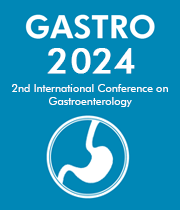Title : Acquirements in the cure of acute mesenteric ischemia over the past 10 years: a case study demonstration
Abstract:
Aim:
To evaluate the results of thrombectomy from mesenteric vessels in the treatment of acute mesenteric ischemia (arterial and venous causes).
Material and Methods:
The results of treatment of 36 patients with acute mesenteric ischemia were analyzed. This patients underwent surgical and endovascular interventions on the superior mesenteric artery (SMA) or superior mesenteric vein (SMV) to restore blood flow. The age of the patients ranged from 59 to 89 years. In 6 patients, acute mesenteric ischemia was diagnosed during laparotomy due to peritonitis (2007-2010), in 30 patients based on clinical data and CT with bolus enhancement (2011-2023). Impaired mesenteric circulation in all patients was not associated with heart failure.
Results:
In the 2 case, thrombectomy from the SMA was performed. The restoration of blood flow in the SMA region made it possible to clearly visualize the viable part of the small intestine. Then, an extensive resection of the small intestine was performed, and a primary entero-enteroanastomosis was formed. This patient has recovered.
In 5 cases, surgical thrombectomy from the SMA was performed, which made it possible to preserve the intestine and avoid its resection. All of these patients have recovered.
In 2 cases, endovascular thrombectomy and SMA stenting were performed. After restoration of blood flow, the ischemic intestine restored its viability, no additional interventions were required. Both patients have recovered.
In 2 cases, after thrombectomy from the SMA on days 2-3, second-look relaparotomy was performed with resection of the non-viable ileum and primary anastomosis. Both patients have recovered.
In 5 cases, thrombectomy from the SMA was performed, which made it possible to preserve the intestines. In the postoperative period, these patients faced the problem of cardiovascular insufficiency, which in all cases led to deaths not associated with intestinal gangrene.
In 18 cases, surgical (16) and endovascular thrombectomy (1) from the trunk of the SMA and resection of the affected intestine did not lead to relief of acute ischemia. After 2-3 days, despite adequate anticoagulant therapy, retrombosis, intestinal gangrene, peritonitis and death occurred in all these patients.
In 2 cases, thrombectomy was performed from the superior mesenteric vein. This made it possible to reduce the volume of resection of the small intestine and complete the operation with a primary entero-enteroanastomosis. Both patients recovered without further events.
Discussion:
A limitation of this study is its non-randomized nature. However, the obtained results demonstrate that early admission of a patient with acute mesenteric ischemia to a surgical hospital with access to CT and interventional operations increases his chances of survival. Visualization of the nature of the intestinal lesion using CT and restoration of mesenteric blood flow contribute to better treatment outcomes.
Conclusions:
Surgical interventions in acute abdominal arterial ischemia must necessarily include restoration of blood flow through SMA using surgical or endovascular approaches. This algorithm allows to save the intestines in some patients. If conditions require bowel resection due to it necrosis, restored blood flow allows safely make primary inter-intestinal anastomosis. In the case of venous gangrene of the intestine, thrombectomy from SMV, performed through its tributaries, identified during resection of the necrotic part of the intestine, can reduce the length of the resection of the small intestine and safely make a primary inter-intestinal anastomosis
Audience Take Away:
-
Acute violation of mesenteric circulation is the most severe emergency pathology of the abdominal cavity.
-
There is no problem in modern abdominal surgery that is farther from its rational solution, than the problem of acute abdominal ischemia.
-
How to improve outcomes in patients with acute mesenteric ischemia



